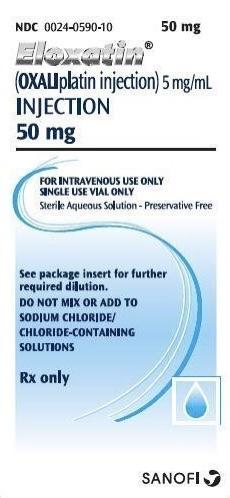Oxaliplatin Dosage
Medically reviewed by Drugs.com. Last updated on Aug 4, 2025.
Applies to the following strengths: 5 mg/mL; 50 mg; 100 mg
Usual Adult Dose for:
Additional dosage information:
Usual Adult Dose for Colorectal Cancer
85 mg/m2 via IV infusion over 120 minutes every 2 weeks; administer in combination with infusional 5-fluorouracil and leucovorin.
Duration of Therapy:
- Adjuvant Treatment of Stage III Colon Cancer: Total of 6 months (12 cycles)
- Treatment of Advanced Colorectal Cancer: Until disease progression or unacceptable toxicity
Comments:
- Premedication with antiemetics, including 5-HT3 blockers with or without dexamethasone, is recommended.
- Consult the manufacturer product information for 5-fluorouracil and leucovorin dosing recommendations.
Uses: In combination with infusional 5-fluorouracil and leucovorin:
- Adjuvant treatment of Stage III colon cancer in patients who have undergone complete resection of the primary tumor.
- Treatment of advanced colorectal cancer.
Renal Dose Adjustments
- Mild to Moderate Renal Impairment (CrCl 30 to 80 mL/min): No adjustment recommended.
- Severe Renal Impairment (CrCl less than 30 mL/min): Reduce dose to 65 mg/m2.
Comments: Caution and close monitoring of all renally impaired patients are recommended.
Liver Dose Adjustments
Data not available.
Dose Adjustments
ACUTE TOXICITIES: Consider prolonging the infusion time for this drug from 2 hours to 6 hours.
AFTER RECOVERY FROM GRADE 3/4 GASTROINTESTINAL TOXICITY (DESPITE PROPHYLACTIC TREATMENT):
- Adjuvant Treatment of Stage III Colon Cancer: 75 mg/m2
- Treatment of Advanced Colorectal Cancer: 65 mg/m2
GRADE 4 NEUTROPENIA, FEBRILE NEUTROPENIA, OR GRADE 3/4 THROMBOCYTOPENIA: Reduce the dose and delay the next dose until neutrophils 1.5 x 10(9)/L or greater and platelets 75 x 10(9)/L or greater.
- Adjuvant Treatment of Stage III Colon Cancer: 75 mg/m2
- Treatment of Advanced Colorectal Cancer: 65 mg/m2
NEUROSENSORY EVENTS:
GRADE 2: Consider reducing the dose.
- Adjuvant Treatment of Stage III Colon Cancer: 75 mg/m2
- Treatment of Advanced Colorectal Cancer: 65 mg/m2
Comments: Consult the manufacturer product information for dosing adjustment recommendations for 5-fluorouracil and leucovorin.
Precautions
US BOXED WARNING: Anaphylactic reactions have been reported and may occur within minutes of drug administration. Epinephrine, corticosteroids, and antihistamines have been employed to alleviate symptoms of anaphylaxis.
Safety and efficacy have not been established in patients younger than 18 years.
Consult WARNINGS section for additional precautions.
Dialysis
Data not available.
Other Comments
Administration Advice:
- Dilute this drug before administration; consult the manufacturer product information for dilution instructions.
- Consult the manufacturer product information for infusion instructions.
- Do not use needles or IV administration sets containing aluminum parts since aluminum has been reported to cause degradation of platinum compounds.
- Immediately discontinue drug administration and initiate usual local symptomatic treatment in the event of extravasation.
- Prior to administration, visually inspect for particulate matter and discoloration and discard if present.
- Prior to subsequent therapy cycles, evaluate patients for clinical toxicities and recommended laboratory tests.
- The administration of this drug does not require prehydration.
Storage Requirements:
- After dilution, the shelf life of this drug is 6 hours at room temperature (20 to 25 degrees Celsius/68 to 77 degrees Fahrenheit) or up to 24 hours under refrigeration (2 to 8 degrees Celsius/36 to 46 degrees Fahrenheit).
- Retain this drug in its original package until time of use. Do not freeze and protect from light; however, final diluted drug does not need protection from light.
Reconstitution/Preparation Techniques:
- Exercise care and use gloves when handling this drug. If a solution of this drug contacts the skin or mucous membranes, wash the skin immediately with soap and water and flush mucous membranes thoroughly with water.
IV Compatibility:
- Do not mix or administer this drug simultaneously through the same infusion line with alkaline medications or media (e.g., basic solutions of 5-fluorouracil, folinic acid preparations containing trometamol, trometamol salts of other active substances) as alkaline products will adversely affect the stability of this drug.
- Reconstitution/final dilution of this drug should not be performed with saline or other solutions containing chloride ions (including sodium, calcium, or potassium chloride).
- Consult the manufacturer product information for additional IV compatibilities and incompatibilities.
General:
- Overdosage: No known antidote.
Monitoring:
- Monitor a full blood count with white cell differential, hemoglobin, platelet count, and blood chemistries (including ALT, AST, bilirubin, and creatinine) prior to treatment initiation and before each subsequent treatment cycle.
- Monitor neurological toxicity; perform a neurological examination before each administration and periodically thereafter.
Patient Advice:
- Avoid potentially dangerous activities such as driving and operating machinery until you know how this drug affects you.
Frequently asked questions
- What is the FOLFOX chemo regimen and is it effective?
- What is the CAPOX (XELOX) chemotherapy regimen?
- Chemo side effects: What should I expect and how to cope?
- How do you manage neuropathy from chemo?
- What is the FLOT chemotherapy regimen and how does it work?
- What is chemo brain and how long does it last?
- What is FOLFIRINOX regimen and how is it used?
- How long does oxaliplatin stay in your system?
- How soon can you start chemo after port placement?
More about oxaliplatin
- Check interactions
- Compare alternatives
- Pricing & coupons
- Reviews (5)
- Side effects
- During pregnancy
- Support group
- Drug class: alkylating agents
- Breastfeeding
- En español
Patient resources
Other brands
Professional resources
Other brands
Related treatment guides
See also:
Further information
Always consult your healthcare provider to ensure the information displayed on this page applies to your personal circumstances.


